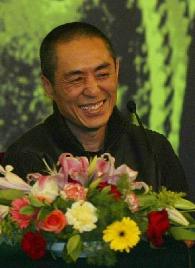After graduation, these first post-Cultural Revolution students (who came to be known as the "fifth generation" Chinese cinema directors) were posted to regional films studios. Zhang Yimou was assigned to the Guangxi studio, which had been founded in 1974, towards the end of the Cultural Revolution. Lacking any clear production policy, the studio was open to suggestions from its new recruits who, in 1983, advocated the establishment of a Youth Production Unit.
This recommendation was readily accepted, and a young production crew, including Zhang Junzhao as director and Zhang Yimou as photographer, embarked on their first picture,One and The Eight, based on a narrative poem set during the war against the Japanese. The film ran into considerable trouble with the authorities and had to be amended in terms of plot and characterization before securing a release. The look of the film, however, remained intact, and it was the striking photographic quality achieved by Zhang Yimou that attracted most acclaim. Zhang has explained that they consciously reacted against the uniform lighting of most contemporary Chinese films and sought a harsh, monochromatic appearance appropriate to the story of prisoners offered a "Dirty Dozen Style" opportunity to redeem themselves.
Following One and The Eight, Zhang Yimou acted as director of photography on the first two films of his contemporary at the Beijing Film Academy, Chen Kaige. The first of these,Yellow Earth(1984), effectively launched the fifth generation outside China and was much commended for its innovative camerawork, in which small figures were photographed against vast expanses of sky. Chen Kaige's second film,The Big Parade, underwent extensive censorship and revision but again Zhang Yimou's camerawork, capturing the agonies of "square-bashing" in the grueling sun -- this time in widescreen -- was much admired.
Zhang Yimou had long wanted to direct himself and was able to do so by transferring in 1985 from Guangxi studio to the Xi'an studio, then run by the imaginative and entrepreneurial Wu Tianming. Wu initially invited Zhang to join him in Xi'an (where he had been born) to photograph his own upcoming productionOld Well. Zhang agreed on the understanding that he could then direct his own first film. In the end, Zhang Yimou not only photographedOld Well, but played the leading role himself, winning Best Actor Award at the Tokyo International Film Festival. (Though acting is only a subsidiary pursuit for Zhang Yimou, he also played the lead in the 1990 Hong Kong costume dramaA Terra Cotta Warrior, opposite Gong Li).
Zhang Yimou's first film as director, Red Sorghum, won the top prize at the Berlin Film Festival in 1988 and launched his international career. A rural drama of the war years, with the Japanese as the enemy, it also marked the acting debut of the young actress Gong Li, whom Zhang had discovered while she was a student. She has since appeared in all his films, winning the award as Best Actress at the Venice Film Festival in 1992 forThe Story of Qiu Ju.
Zhang Yimou followed up Red Sorghumwith a more conventional action picture,Operation Cougar, depicting the hijacking of an airliner, but returned to form withJu DouandRaise The Red Lantern, both intense and beautifully shot period pieces that were nominated for Oscars as Best Foreign Language Film in 1990 and 1991.Raise the Red Lanternwon for Best Foreign Film in 1991 at the New York Film Critics Circle. Also in 1991, the movie won for Best Cinematography at the LA Film Critics Association.
The Story of Qiu Jumarked a conscious change of direction for Zhang Yimou -- away from the ornate style of his previous two films towards a more realistic and even humorous manner. In particular, he made use in this film of hidden cameras to capture the gestures and reactions of real Chinese peasants photographed unawares. It was rewarded with the Golden Lion at the Venice Film Festival, while Gong Li's performance was also recognized at the closing awards ceremony.











